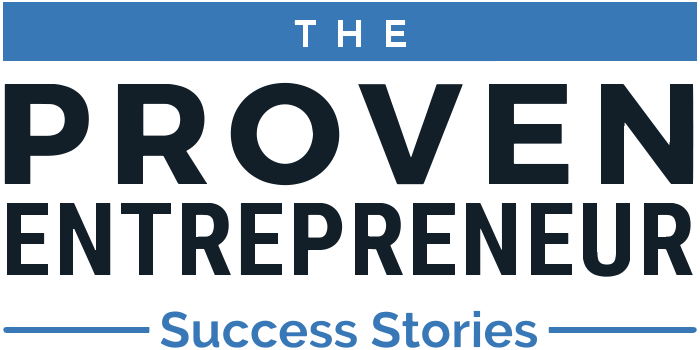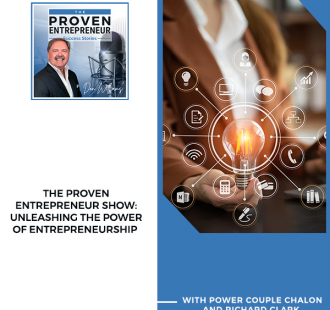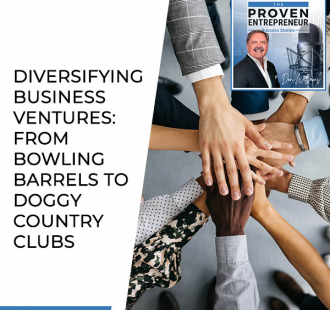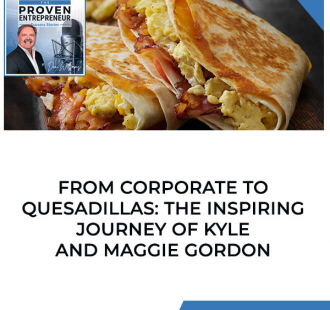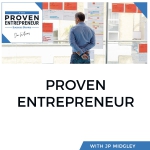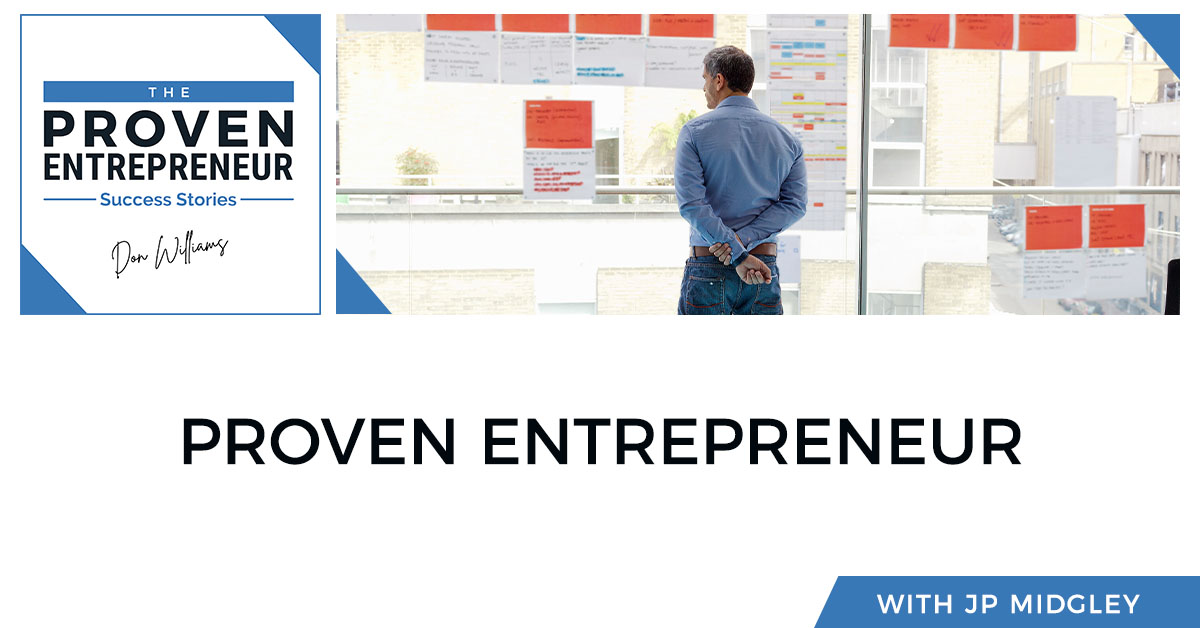
Helping a company grow is one thing. Owning it later is another. So what does it take to go from employee to owner? Listen in as JP Midgley shares his success story with host Don Williams. JP started with Avalon as a Customer Service Representative and later bought the company! In this episode, he shares with us the journey that took him to get to where he is now. JP also imparts some of the wisdom he learned about entrepreneurship and leadership.
—
Listen to the podcast here
Proven Entrepreneur – JP Midgley
From Front Line Customer Service To Proven Entrepreneur
Our guest is JP Midgley from Buffalo, New York. JP is the CEO of Avalon. Welcome, JP.
Thanks for having me.
Thank you so much for coming on. W e met each other at Entrepreneurs’ Organization. JP is one of my valued co-authors in the upcoming gratitude book. We’re at 3rd and goal on the 60-yard line. We’re almost to the end zone. It has taken a while. Thank you so much for your participation there. JP, tell us a little bit about Avalon. What are you doing now? What does your business do?
We do a number of things. Our primary business is litigation support. A common question after that is, “What does that mean? What is litigation support?” The answer to that is many things too. It’s anything from traditional litigation support such as copying or scanning documents associated with a lawsuit or in support of a law firm. Sometimes we do that on a large scale with hundreds of thousands of documents. Over time that has changed from paper records to digital. Now we collect email, server and digital files. We build these databases and help attorneys get through the review of those and produce them to the other side. That’s our primary business.
Because we have a computer forensics division that does that for lawsuits, we spun that out into a cybersecurity division as well that responds to data breach type of cases and proactive cybersecurity services. Also, because we have that equipment that does copying records, we do a lot of document automation, scanning documents for businesses or print mail of secure documents. We think of that type of business as well. We’re a little diverse but our primary business is litigation support.
How long have you done that?
Avalon started in May of 2000. I’m not the founder. I started in 2004 on my birthday. I always know the first day I started, January 12th, 2004. I had the opportunity to help the business grow in those early days. I ultimately had the opportunity to buy the business from the original founder. There were a number of friends and family investors. We’re able to buy them out and continue growing this company since then.
When you're unhappy, everybody knows it. Click To TweetYour client base, are they in New York? Are they regional, national or international?
All in the US but they are all over the place. We have nine physical facilities across Upstate New York, Utica, Syracuse, Rochester and Buffalo. After I was able to buy the company, we expanded into Cleveland, Ohio and Tampa, Florida. A couple of years ago, we expanded into Omaha, Nebraska, Grand Rapids, Michigan, and Detroit, Michigan. We do a lot of the quick turnaround-type of boots on the groundwork in those cities. Our tech team do work across the country because we don’t need to be physically in any one spot for that.
It sounds like you’re on the global domination plan.
We do have a take over the world plan here for sure.
That’s true entrepreneurism. You went to work for a company and helped them grow. It sounds like you raised some capital, purchased the company and here you are several years later as the CEO.
Some of what you said is pretty correct. I will give you the high level. When I started in 2004, I was totally entry-level. I was a customer service representative. I was driving my own car to law firms, picking up documents, bringing them back, getting them into our operations team, delivering them, and then delivering them back after. I was ground level at that time but I worked hard. I was able to get some opportunities.
When you said raise capital, we got traditional bank funding. I shopped to almost every bank I could find. Every single one of them said no until finally, one said yes. I got lucky. That was in the 2009 and 2010 timeframe. We had to get creative with the farmer-owners that want to exit and we did want to buy it. I had a partner when we originally bought the company. He’s since moved on as well. That is the story. I feel like I got pretty lucky along the way.
Sometimes luck is aided by a good work ethic. It sounds like you probably had that. How many banks said no.

At least ten, I would say. There was a stint in there I was like, “I can’t get this from banks. Maybe I’ll go to my friends and family.” I still have a letter that I had written. I asked in front of the family to invest with me. I was trying anything. I did have a couple that said, “We can invest a little bit.” I still remember who those people are because they probably didn’t want to but they wanted to help me. I appreciated that. I still have the letter because I remember how much I was trying to make this all work. I remember how lucky I felt when finally I had the right bank or he understood what we were trying to do.
It helped me understand how important to have a good banking relationship with a banker that understands what the company is doing. At the outset, a lot of people look at our company and they look at our websites and say, “You’re a printing company.” I said, “Not really.” It’s hard to get people to understand what we do. We found the right person and they did understand it. They were able to sell the deal internally. Ultimately, the rest is history.
That was history. Were you born and raised in the Buffalo area?
No. I grew up in Syracuse. I grew up in a family that had a commercial printing company. I did come from that world ironically. I went to school for jazz guitar. I have this jazz guitar degree. I still play the guitar. I realized quickly after I got that degree that it was going to be hard to make a good living just by playing music. I’m a very good guitar player but I am not world-class. If you want to be making a good living, you need to be world-class. I was looking for a job. Somebody said, “This company, Avalon, is hiring.” I said, “Sure,” and off I went.
Did your parents own a commercial printing company? Did you come from entrepreneurial roots?
A little bit. It was my father and his brothers. It was started by my grandfather and my grandmother. It’s called Midgley Printing in Syracuse. It’s still there although it’s one brother left that’s still running it. It was an entrepreneurial family. Not only did my father run this printing business, but he was also big into cooking. We had this food truck before food trucks were a big thing. We would go out and the family would go and squeeze lemonade at the festivals. We would pull up this trailer and make burgers and French fries and squeezed lemonade, stuff like that. We had a few things like that and of course, the paper route, which is a lot of people’s first form of business.
We’re dating ourselves now because there are so many people that are like, “What are you talking about, paper route?”
That was child labor before they realized that it’s not legal.
You either decide you're not going to grow, leave your business, or grow yourself and help the company grow. Click To TweetIf we go all the way back to young JP growing up, what was your first job? Whether it was official or maybe your first job was working in the print shop. As you look back, what would you say was your first job?
I’m going to give you three answers. I would consider the paper route to be a job because you’re delivering newspapers. The worst part of the paper route wasn’t even delivering the newspapers in the snow or the rain. If you have had a paper route, you know what the worst part is. That is collecting the money.
Walking door to door and asking people to pay for what you did. Some people gave you a hard time with that. I would go to work at the family print shop but not officially. It was more like, “Go to work with that kind of day.” My first real job after that was I worked at an ice cream shop making ice cream cakes and flying saucers and scooping sundaes and stuff for people. I did a bunch of different things in college after all of that and during that. I did play in a band. There were a lot of people playing a band but we were a little more official, a little more professional. We have vehicles and equipment. We would drive around from city to city and we would get paid to perform. That would be my first entry into entrepreneurialism.
After your childhood in Syracuse, did you go to school? Did you go to the military to join the Merchant Marine?
I went to school for music. I went to Ithaca College about an hour away from Syracuse. I got my degree in jazz guitar. I started working at Avalon. I’m still playing music and trying to make both of those things work. A couple of years after that, I went to the original CEO. I told him, “I don’t know where I’m going to go but I don’t want to live in Syracuse my whole life. I don’t want to regret this. Call this a notice but it’s not really a notice. I don’t know where I’m going and when I’m going but I’m going to go somewhere. I just want you to know.” The response I got back was, “I don’t want to lose you. Why don’t you tell me where you want to go and we’ll open an Avalon there?” I said, “That sounds pretty good. I do like this company.”
I made a business plan for Charlotte, North Carolina. I didn’t know how to make a business plan. I googled it or whatever Google was back then. It was still Google. I made a business plan. I’m still trying to sell. At that point, I was doing sales and some other stuff in the organization. On my band’s Myspace page, I was looking at the people that followed our band and there was this woman. She was an attorney. She followed our band. I’m like, “It’s a great sales opportunity. She already knows me. She knows the band.”
She lived in Buffalo. I sent her a message and said, “I want to take you to lunch.” I was thinking I was going to go on a sales call. I drove two and a half hours from Syracuse to go to lunch with this attorney in Buffalo. It didn’t take long to realize that I was going to marry her. My business plan changed from Charlotte, North Carolina to Babylon and Buffalo. That’s how I ended up in Buffalo.
I love that. How romantic. I wrote a book called Romancing Your Customer. Romance is pretty big in my life, business, family and personal. Looking back, is there a hard moment? Is there some time in your business history when maybe it was brutal or it was like, “This is not working the way I need it to work,” that you would feel comfortable about sharing with us?

I have so many of those
As we all do. What proven entrepreneurs know is that failings are an integral part of the success story.
I’m always looking at my phone here. The reason I’m looking at my phone is because I keep a list of things I messed up. I want to be able to remind myself of all these things I screwed up. There are many of these moments. There are times that are tough. Unfortunately, a lot of entrepreneurs experienced some employee theft type of situations. We’ve had some of that happen in a business. In my role, it taints me and says, “Can I trust this team or not?” The answer is you can. Unfortunately, sometimes people violate that trust.
The more I think about it, I got this list of things I screwed up for sure. A few years ago, I remember we were distinctly thinking about how we were not where I wanted to be yet in growing. I wanted to keep growing but it felt so hard. I felt like I was dragging the company with me. I was the bottleneck. I had inserted myself into everything. I was grumpy and I heard that from my team. I would ask them, “Tell me what I’m doing or what I’m not doing.” They said in the most delicate possible way, “When you’re unhappy, everybody knows it.” I’ll never forget that.
I was like, “There are times I’m unhappy. I probably do let it be known.” I’m not a yeller and screamer but there are different ways to let people know. At that moment, I realized that if I wanted to grow where we wanted to grow, I needed to be a better leader. That was the moment I was like, “This isn’t working the way I thought.” It’s because I didn’t know what it was going to take to grow where I wanted to grow so I went to work at becoming a better leader.
I started reading nonstop books on leadership. In Entrepreneurs’ Organization, there are a few different programs. An entrepreneurial master’s program that I was looking at was about scaling your business. There is a global leadership academy program. I’m like, “I want to do both of those but right now I feel like I need to be a better leader.” That’s where I started. It was a totally life-changing program. You’ve been through that program too, Don. You know what I’m talking about.
I wouldn’t say that gave me all the answers, but it put me on the right path to becoming a better leader. I have held strong in staying on that path and trying to better myself. I feel like with every step I have taken to become a better leader, I got so much work to do. I feel like the company has grown. I do attribute a lot to that moment when I realized that I’m not the leader that I need to be to bring this company where I want. That leaves me with a couple of options. You either decided you’re not going to grow, you leave your business or you grow yourself and help the company grow. That’s the path I chose.
My journey with Entrepreneurs’ Organization is I joined to elevate my business. I’m not sure exactly when but at some point, I crossed over to this. For me, the fact is that the best way to grow my business is to grow me, and then everything rises. All boats ride higher on a high tide. When I’m at a high tide, everything in my life does better. I’ll give a plug for that Global Leadership Academy or the regional or any of the leadership academies. It’s totally life-changing. They did not give me all the answers. It did illuminate some of the questions. Part of that leadership journey is knowing what questions to ask and not seeking perfection but just improvement.
Words matter. Be careful with them. Click To TweetI was so frustrated with my business at that time. I felt like I was dragging everyone with me. Through all that reflection, programs and stuff, I realized that I wasn’t dragging them with me. I was capping them. I was stopping it because of my own limitations.
I have looked at my own path at times when I felt like I was a weight on the business. When I did elevate myself, it was almost like cutting the weight. As soon as I snipped the weight, everything bounced to the top. It’s hard to have that realization but I’ve seen that a couple of times in my path. What about warp speed. Warp speeds are in the news a lot because of the vaccination. I remember back when Captain James T. Kirk on Star Trek was like, “Scotty, we’ve got to have more power.” Scotty somehow brought warp speed out of a dying Enterprise engine. Sometime in your business, things were not going well but all of the sudden, the clouds parted, the sun shone, the angel sang and things started doing well. Do you have one of those that you can share?
There are these times when it felt like we were working hard. There are times when it seems easy. We talked about those times too. The first one that comes to mind is a couple of years after we bought the business, we acquired a company in Cleveland, Ohio. It was pretty scary for me. I was like, “What am I doing? What’s going on here?” but we did it. We were acquiring this company and we grew revenue from that, but we grew beyond what we had acquired. It was because we acquired talent and we had some tools that they didn’t have and they had some tools we didn’t have.
It was like a one plus one equals not even three, but four or five situations. It was great because we thought maybe if all the stars aligned, these things could happen. If we brought these better technology tools to that company, maybe they’ll have these great relationships. They can sell their clients on it. That did happen. We were not a strong sales organization but the CEO of that company who is still with us was our Chief Sales Officer. He was strong in sales. He helped us build out a real-life sales team.
Now we have twenty-plus people in sales. He’s done that for us. We were able to use his great expertise to help us. They had some service lines that we didn’t have but we had relationships. Everything lined up. It felt easy at that moment. Things really worked out. We’re growing because of resources and talent and putting it all together at the same time.
It’s powerful to weave different threads into cloth in an organization. People have different skillsets and then to set the vision, let them go manifest. Let’s play make-believe. If you could go all the way back to when you were twenty and you could have a conversation with your twenty-year-old self, what is one thing you would share that you wish you knew then that you know now?
There are a lot of those things but I’ll just give you the first one that comes to my head. The first one I can think of is words matter. I can’t tell you how many times I didn’t even know I said something that bothered somebody. Later on or sometimes years after that moment, I’ll be talking to them and maybe I’ll ask them a question or something about the past and they’ll bring up something I said that bothered them. I didn’t think about that for one second but it stuck with them for this long. They’ve been carrying this weight of being bothered by something that was said for that long.
That’s what I would tell my twenty-year-old self, “Make sure you mean what you say and think about what you say before you say it because you have an impact on people, especially in a leadership position.” People are looking at you and watching what you’re doing. They’re listening to what you say way more than you realize. It will stick with people.

The words you don’t use matter as well. There’s a time when a leader should be stepping in and making it clear the personal values and company values. If you don’t say anything, people notice that too. That’s the last of my problem because I tend to say too much, but we’ve probably all seen moments in other organizations or you’re wondering why somebody hasn’t stepped in and said something. The lack of words sometimes matters. My long-winded answer is I would tell my twenty-year-old self that words matter so be careful with them.
I can’t think of the philosopher who said, “Words are the clothing of our thoughts,” so be careful how you dress. Words are going to be so uplifting and encouraging. People will remember those maybe for a lifetime. The other one is, “Silence means consent.” Zig did quote that but I think it goes back to Plato or Demosthenes. Those are old yet wise words. As leaders, there are times when we have to plant a flag in the ground and say, “No, we’re not doing this. We are going to do that.” If you had a magic wand and you were king for the day, and a Proven Entrepreneur tribe could support JP in some way, what would that be? What could we do for you?
If there’s an entrepreneur tribe and I do look at entrepreneurs like that, I’m going to answer from that perspective, because I think that tribe does provide something for me. That’s not what I thought it would be. We joined the Entrepreneurs’ Organization. I thought I wanted my tribe to help me tactically grow my business and answer this question for me. How do I do this? How do I create a 401(k) for my team? How do I create a policy? How do I recruit?” All these things. You can get all that but it’s secondary to the support validation. There’s the imposter syndrome in entrepreneurs.
I know a lot of people have that, myself included. Sometimes I’m wondering, “How did I get here? Do these people know that I’m just making this up every day and I’m not worthy of what I’m doing?” We have those doubts. What I get with that magic wand and from that tribe is telling me, “Shut up. You are smart enough. We look up to you. You are a valid leader.” The whole lonely at the top thing is real. We’re not necessarily going down our org chart and telling people the challenges we have. You need that support. Getting that from that entrepreneurial tribe is important. It has been huge for me.
Everybody’s the CEO of them. Maybe they don’t own the company. Maybe they have never bought and grown or maybe they’ve bought and lost the company. They are still the CEOs of something of their own life. That imposter syndrome is a human issue. Maybe it’s magnified in us entrepreneurs but that’s a human problem. I know this philosopher. This is one of my favorite quotes, “You’re far better, far smarter, far stronger than even you think.” Do you know which philosopher that is?
No, but I’ve heard that quote before.
That was Winnie the Pooh. That is one of my favorite quotes ever. That applies to all humans and certainly to entrepreneurs.
Sometimes you don’t know how strong you are and all those things until you have to be.
Sometimes, you don't know how strong you are and all those things until you have to be. Click To TweetWhen people get out of their comfort zone, they’re like, “I want to stay in my comfort zone. It’s comfortable in there. Why would I want to leave the comfort of my comfort zone? It’s counterintuitive. It’s comfortable here. I would like to stay here.” When I get out of my comfort zone, what I find is I performed better than I thought I would. What I teach to my clients is to get out of that comfort zone every day. Exit your comfort zone and it will grow and exit it again, and then you’re just racing out of it. It’s not haphazardly but get out of that comfort zone.
On that same point is when I was talking about being that roadblock for a company. Some of that comes into play. I see that often in leaders in our own company here where they have people that report to them. We start critiquing the work that’s being done for us like, “I could do that better. I should do that better.” You take it away from them and you do it. “That PowerPoint isn’t as good as I could have created it. That report is not as good as I could have created it. Let me handle the sales call because I can close the deal.” You end up doing that type of stuff and you’re robbing your team of the moment where they can get out of their comfort zone.
They will never get better because you’re taking that opportunity away. I’ve consciously looked at moments and said, “I could probably do this better, but I want them to get uncomfortable and have that opportunity.” Now I find a lot of power in pushing people out of their comfort zone. Oftentimes, now they are better than me and better than I was back then too. It’s because they are better than me at these things. I just had to give them an opportunity.
That folks would be leadership 101. Many times, we throw the word leadership around a little cavalierly that this or that person is a leader. The question I’m always asking is, “Yes, but are people following them?” That doesn’t mean they are not a leader because they’re in the position, but they are certainly not at the height of what a leader is unless they have people that willingly follow. You can’t be a leader if you don’t have a follower somewhere just by definition. Let’s get off of the business and maybe get to our last question. I enjoyed our time together. What’s a passion project. What’s something that’s not business that you care deeply about and get some time, energy, brainpower and maybe some dollars? Any passion project for you, JP.
I had one that I was still mulling around with. It had to do with memories and capturing memories and delivering them to people in the future. I had this idea which I’m trying to revamp now because I don’t think it was working the way I wanted to. To me, memories are important. I’m all about creating these moments and memories with friends and family that they will think about forever. That’s a good example. You have the ice cream sundae challenge at the restaurant like, “Can you eat this obscene amount of ice cream in 30 minutes?” I’ll be the guy that says, “We have to do that.” “Why?” “Because we’ll remember this forever. We’ll remember stuffing ourselves until we are sick.”
I want to capture these memories because that’s what lasts beyond people’s life. I was working on this project of automating how we capture memories, just the most important ones, and then store them away and deliver them back to people either like a photo book or something in the future with comments and commentary that people have never seen before.
I like that but it was hard to get people to pay for something now that they might not get for 10 or 20 years. That was a passion project. It’s something I’m trying to do on the side and something personal. I’m passionate about music still. I built a home studio. I’m trying to get back into that and playing music and recording music. I have a lot of hobbies but there are hobbies and there are passions, I would say.
Next time, maybe we can do it from your studio. I’ve seen it. It’s a totally different look from this room at the office. I would love to do that. JP, I am so grateful that you would come on the show and share your success story in all candor, the good, the bad and maybe the ugly, with our audience. Reach out to JP Midgley at Avalon for any litigation support needs. He will take good care of you. Thank you so much.
Thanks for having me
Important Links
About JP Midgley
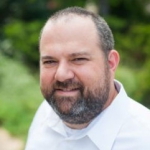 I am a champion of gritty teams and solutions. When someone has a problem, I am unable to sit still- instead, I jump into action and develop an out-of-the-box strategy.
I am a champion of gritty teams and solutions. When someone has a problem, I am unable to sit still- instead, I jump into action and develop an out-of-the-box strategy.
I am creative and resourceful when it comes to solving problems. People say I am tenacious, and that is an advantage when posed with an issue. No challenge will ever beat me.
